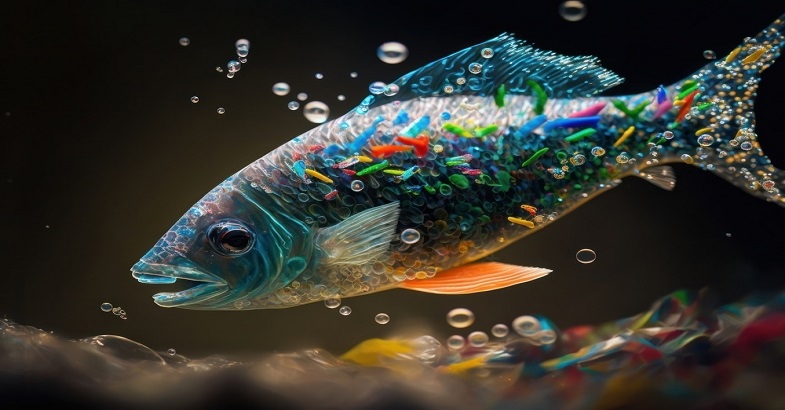
World Environment Day is a significant global event celebrated annually on June 5th. Each year, this day serves as a platform to raise awareness and take action on critical environmental issues. This year’s World Environment Day theme focuses on plastic pollution #Beat Plastic Pollution.
Today, the entire world is facing the challenge of plastic pollution. It has been estimated that around 500 million tonnes of plastic are produced annually, approximately half of which is for single-use purposes. Today, huge chunk of plastics has found their way in aquatic ecosystems such as lakes, rivers and seas. Besides, these plastics contaminate our soil, and burning them releases severe chemicals into the atmosphere, making it one of the gravest threats to the planet. According to data from our regulatory authorities, such as CPCB, 26000 tonnes of plastic is generated daily in India, and more than 10000 tonnes of plastic remain uncollected daily.
Plastic Pollution: A Global Challenge with Far-Reaching Consequences
Plastic pollution has emerged as a significant challenge for the entire global community. The issue of plastic waste arises when plastic waste accumulates in diverse ecosystems. Plastics have a wide range of applications in different industries because of their versatile and durable nature. However, because of its longevity, plastic can persist in the environment for hundreds of years, resulting in profound health and ecological repercussions.
Plastic waste is associated with substantial economic loss. Proper management of plastic waste, including its collection, segregation, disposal and recycling, results in significant financial burdens on the administration. Plastic waste, particularly along beaches and shorelines, negatively impacts the tourism industry, resulting in loss of revenues. Therefore, the Blue Fag certification for the cleanest beaches is gaining a lot of attraction in the tourism sector.
The impact of plastic waste on animals in aquatic, marine, and terrestrial ecosystems has been profound. When animals consume plastics, it seriously impacts their digestive systems, resulting in their death due to intestinal blockage or starvation. Plastic pollution can damage and destroy habitats like coral reefs, wetlands, and forests, affecting the biodiversity and balance of ecosystems.
Addressing Plastic Pollution: Collaborative Solutions for a Sustainable Future
Plastic waste is also associated with an increase in various forms of Pollution. Plastic waste in landfills can contaminate soil, releasing toxic chemicals and degrading land quality. The impact of plastic waste on human health is also very profound. Incineration of plastic waste releases hazardous substances such as heavy metals, persistent organic pollutants (POP), and other toxic chemicals into the atmosphere. These chemicals remain in the ash residue and are correlated with various health issues such as asthma, endocrine disruption, and cancer. Plastics can enter water bodies, polluting rivers, lakes, and oceans. They can harm aquatic ecosystems, disrupt marine life, and affect water quality. It has been found in various studies that these chemicals affect the biological and reproduction process of aquatic animals, resulting in reduced numbers of offspring, thus disrupting the entire food chain.
The solution to plastic pollution problem requires concrete action with the support of all stakeholders, involving individuals, industries, governments, and international collaborations. The environmental and health impacts of plastic pollution can be mitigated by collective action, and only then can we think of moving towards a more sustainable future.
We can reduce plastic consumption by opting for reusable alternatives like cloth bags, water bottles, and food containers to minimise single-use plastics. This problem can also be tackled by promoting the consumption of biodegradable or edible plastics made from ingredients such as bagasse, corn starch, and grain flour. Awareness should be spread among the public about proper sorting and disposal methods of plastic waste to increase recycling rates.
Government Action and Collaborative Solutions for Combating Plastic Pollution
The government should play its part in tackling this problem. It should encourage businesses to adopt eco-friendly packaging materials, such as biodegradable or compostable options. The government should consider providing some economic incentives to stimulate the adoption of products that will benefit both businesses and the environment.
Addressing the plastic pollution problem requires a multi-faceted approach involving individuals, industries, governments, and international collaborations. By taking collective action, we can mitigate plastic pollution’s environmental and health impacts and move towards a more sustainable future. Organise clean-up initiatives to remove plastic waste from beaches, rivers, and other natural areas, involving communities, NGOs, and governments, can be a very good start in this direction.
Multiple actions are being taken on the global front to counter this challenge of Plastic Pollution. A committee has been formed under the United Nations Environmental Assembly (UNEA) to prepare a legally binding Plastic Treaty by 2024. There have been other initiatives, The Global Tourism Plastics Initiative, which aims to address the issue of Plastic Waste in the tourism sector. There are also other initiatives taken at the regional/continental level.
India has taken several steps to combat plastic pollution. The government introduced Plastic Waste Management Rules 2016, which provide guidelines for effectively managing Plastic Waste in the country. It has the provision of EPR-Extended Producer Responsibility, which makes it mandatory for producers, importers, and brand owners to collect, segregate and manage the plastic waste generated by their products. Several states and cities have formulated laws/policies that ban the use of single-use plastics or restrict their use. For example, states like Maharashtra, Tamil Nadu, and Himachal Pradesh have banned certain types of plastic bags. Many NGOs and citizens are also taking concrete action in combating Plastic Pollution.
In conclusion, Plastic Pollution severely threatens our planet and demands immediate action. However, collaboration between governments, industries, and communities is crucial to effectively address the root causes of plastic pollution. Investment in research and innovation to develop eco-friendly materials and recycling technologies is imperative. As responsible stewards of the planet, we must reduce, reuse, and recycle plastics. We can make a significant difference by making conscious choices, embracing sustainable alternatives, and advocating for change. The time to act is now, for a world free from the suffocating grip of plastic pollution, where nature thrives, and future generations can inherit a cleaner, healthier planet.
About the authors:

Sachin Kumar Singh has done his B.Tech from Guru Gobind Singh Indraprastha University. He has worked with the Government of India in the domain of Public Policy. He is a student of PGP at the Indian School of Business.

Saumya Singh has done her post-graduation in International Relations and Politics from Jawahar Lal Nehru University, New Delhi, India. She is the former Creative Head of Women’s Development Cell of Lady Sri Ram College, New Delhi. She is passionate about writing on women-centric issues across the subcontinent and probing national and international issues. She is a student of PGP at the Indian School of Business, Hyderabad
DISCLAIMER : The views expressed in this blog/article are author’s personal.

